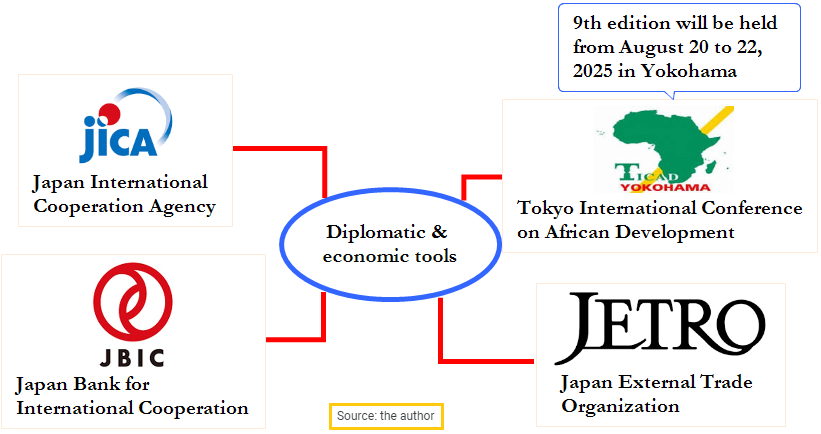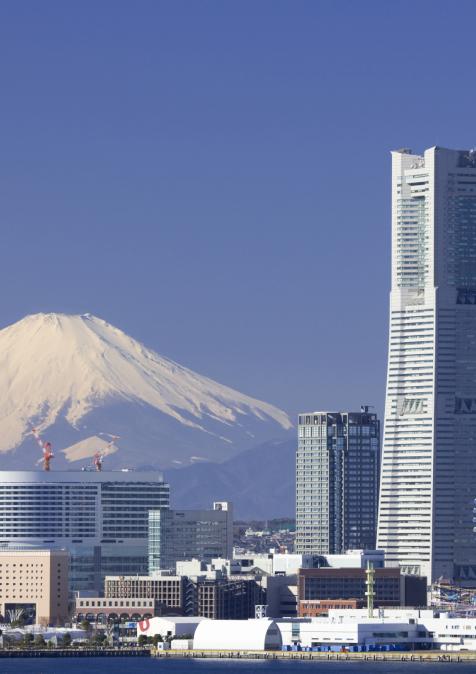Publications /
Opinion
This opinion was originally published in japanupclose.web-japan.org
Intense diplomatic ballet in Africa
The past two years have been marked by two important visits: that of Prime Minister Kishida visit to four countries in 2023, and his Minister of Foreign Affairs Yoko visit Yoko to three countries in 2024.
Prime Minister Fumio Kishida Visit: Japanese Prime Minister Fumio Kishida was on an African tour from April 29 to May 5, 2023, visiting four African countries, including Egypt, Ghana, Kenya, and Mozambique, this visit comes ahead of the G7 Summit in Hiroshima.
Kishida's African tour, a first since 2014 for a Japanese leader, is also motivated by Japan's desire to reduce the influence of other foreign powers, namely its Chinese neighbor on Africa. Before returning to Japan, he also visited Singapore and then South Korea.
During the Tokyo International Conference on African Development (TICAD) summit held in 2022, the Kishida administration announced granting $30 billion in public and private funds to Africa over three years and training more than 300,000 African nationals in several fields. The Kishida administration also plans to strategically deepen cooperation with African countries, primarily through the TICAD, marking its 31st anniversary in 2024.
At a related meeting in Tokyo last August 2022, Kishida said in a video message: “African countries are gaining importance and influence on the international stage. Japan aspires to be a collaborative partner, fostering mutual growth with Africa.” The major theme of the Group of Seven summit in Italy in 2024 is aid to Africa. Subsequently, the 9th TICAD is planned for 2025 in Yokohama. Observers will closely monitor to what extent the meeting can build on discussions at the G7 summit and formulate crucial policies for Africa's development.
Foreign Minister Kamikawa Yoko Visit: Kamikawa visited three African countries to promote economic cooperation, including Madagascar, Ivory Coast, and Nigeria. She met with her Malagasy counterpart and confirmed that they would cooperate in efforts to realize a free and open Indo-Pacific (FOIP) under the flagship Japan initiative. During his visit to Nigeria, a country rich in natural resources, Kamikawa and his Nigerian counterpart Yusuf Tuggar agreed to promote economic cooperation, including aid to Nigerian start-ups.
At the end of her African tour, she said she believed the economic dynamism she felt during her visit would benefit Japan's economy, during a press conference. After Africa, she then traveled to Sri Lanka and Nepal, after attending an OECD meeting in France. His tour of African and Asian countries is part of the Japanese government's efforts to step up cooperation with emerging economies and developing countries, collectively known as the Global South.
For Madagascar, Kamikawa was the first Japanese foreign minister to visit that country, an island nation in the Indian Ocean. Madagascar has ample reserves of critical minerals. Japan is seeking to establish more resilient supply chains to meet its needs for critical minerals, in particular for electric vehicles. Japan is a net importer of fossil fuels and has historically invested heavily in the oil and gas sector. It is therefore necessary to maintain these investments to a certain extent. However, it is now crucial for Japanese companies to broaden their horizons to critical minerals. Indeed, the African continent is one of the main suppliers of these minerals. As a reminder, the Japanese Minister of the Economy, Nishimura, also visited five African countries in August 2023, all with large mineral reserves reviews.
Mineral diplomacy: Japan seeks stronger ties with Africa on critical minerals
Global demand for lithium, nickel, cobalt, and other metals needed for batteries and electrification technologies is expected to explode. The supply chains needed to bring raw materials to market face many challenges, and refining capacity is heavily concentrated in a few countries. Critical mineral supply chains were a key topic when G7 energy and environment ministers met in Japan in April and agreed to strengthen cooperation in this area.
More renowned for its discretion, Japan has launched a charm offensive on the continent to carve out a place within the African Metal Club. The Japan Organization for Metals and Energy Security (JOGMEC), the body responsible for raw materials, formalized in August 2023 a series of contracts with three African countries to strengthen and secure minerals supplies essential to its energy transition. Japanese Minister of Economy, Trade, and Industry (METI), Nishimura Yasutoshi, accompanied by the JOGMEC representatives toured five countries in southern Africa, notably Angola, Madagascar, DRC, Namibia, and Zambia, all with large mineral reserves reviews. The Japanese diplomates aims to lay the groundwork for boosting investment in African critical minerals during a five-country visit.
Tokyo has signed contracts with 3 countries, particularly with Namibia, Angola, and the DRC. In the DRC, Japan has committed to investing $1 billion to explore rare minerals in this country rich in cobalt, lithium, and copper. In Zambia and Namibia, a memorandum of understanding was signed to develop exploration and exploitation operations by Japanese companies, ensuring the supply of essential minerals to the Japanese archipelago.
Coupled with this, in 2013 the METI held the “Japan-Africa Ministerial Meeting for Resources Development” to encourage Japanese enterprises to proactively invest in developing Africa’s resources. This meeting was attended by the Ministers of Natural Resources from 11 African countries. In addition, the African Diplomatic Corps and the African Development Bank have organized the “Japan-Africa Business Forum 2014” in Tokyo to harness the substantial new business opportunities in Africa.
The reason for this interest is clear: Japan has to import 100% of almost all base metals and minor metals from overseas. Such commodities are essential for Japan’s continued dominance in the car manufacturing industry (particularly of hybrid cars) and the electrical appliances industry. A crucial part of Japanese governmental strategy has therefore been to support the stable supply of natural resources for Japan. Japanese companies have already made considerable investments in the mining sector in places like Indonesia, Australia, and Latin America in furtherance of this strategy – but also the supply of deposits from Africa, to enhance the Japanese manufacturing industry.
JOGMEC has invested in several exploration joint ventures in South Africa particularly in nickel and the platinum group metals, and a rare-earth joint venture in Malawi. This joint venture model expands across the continent, including Congo, Zambia, and Mozambique where inter-governmental memoranda with Japan have been signed for cooperative exploration and development.
The Japanese diplomacy tools in Africa
In 1974, then-Foreign Minister Toshio Kimura made the first official visit by a Japanese official to the continent, taking him to Egypt, Ghana, Nigeria, Zaire, and Tanzania. After the second oil crisis of 1979, Naochi Sonoda, then Minister of Foreign Affairs, visited Ivory Coast, Nigeria, Senegal, Tanzania, and Kenya. These two visits confirmed Tokyo's desire to diversify both its imports of raw materials and its investments. Foreign Minister Shintaro Abe visited to Zambia, Ethiopia, and Egypt in 1984.
While the Japanese Ministry of Foreign Affairs had an Africa department since the 1960s, it was not until 2001 that the first visit by a Japanese head of government to the continent took place. This situation caused Tokyo to lose a lot of time and opportunities compared to other players. Despite these representations, only four prime ministers have made an official visit to Africa after TICAD 1993: Mori in 2001, Kiozumi in 2006, Abe in 2013, 2014 and 2016, and Kishida in 2023 (see Redouan Najah's paper on "Japan in Africa: an active but discreet actor" in French).
Japan's growing involvement in Africa is not new. In 1993, Japan launched the Tokyo International Conference on African Development (TICAD), aimed at promoting high-level political dialogue between Japanese leaders and their African partners. The process, which is now in its 9th edition, emerged after the end of the Cold War, a flagship initiative of Japanese diplomacy in Africa. The 9th TICAD will be held in 2025 in Yokohama from August 20 to 22, 2025. The opportunity to recall the main lines of Japan's foreign policy, which is becoming increasingly "Africanizing ".
Tokyo's action in Africa is also notable, and not only at the level of TICAD, based on the Japan-Africa partnership. Japan participates in peacekeeping efforts, economic engagement & cooperation by other tools: JICA, JETRO, JBIC, JOGMEC…

Japan initially established its relations with African countries from a primarily economic perspective, focusing particularly on development and humanitarian aid. However, significant adjustments have been made in the principles underlying Japan's African policy today. From now on, in addition to economic considerations, Japan's relations with African countries include political dimensions. This development stems in part from Japan's aspiration to become a permanent member of the United Nations Security Council (UNSC). Thus, the country seeks to establish closer ties with African nations, knowing that they represent the largest constituency within the UN.
Japan is intensifying its diplomatic efforts with Africa, to strengthen collaboration with a coalition of emerging and developing countries known as the “Global South”, renamed the “New South” at the initiative of Morocco, notably through the Policy Center for the new South, bearer of this paradigm, which is very well represented by a country like Morocco. A medium income country representing a bridge between Africa and the Wider Atlantic and Europe through the Mediterranean, holding a win-win cooperation vision with all countries whether from the north or the south, including Japan.
In this context, during his visit to Japan on May 31, 2024, the Moroccan Minister of Foreign Affairs Nasser Bourita held a bilateral meeting with KAMIKAWA Yoko, Minister of Foreign Affairs of Japan. The two ministers signed the “Memorandum of Cooperation for a Strengthened Partnership”. He also meets with the Minister of Economy, Trade and Industry of Japan, Ken Saitō. During this interview, Mr. Bourita presented the structuring projects with high impact on the Atlantic coast, particularly those underway in the Southern Provinces, such as the port of Dakhla Atlantique, which will ensure cross-border connectivity with the countries sub-Saharan. For his part, the Japanese minister announced the appointment of an economic representative to the Japanese Embassy in Rabat to strengthen commercial relations and promote the establishment of Japanese companies in Morocco. Sign of a new beginning for relations between the two countries.







